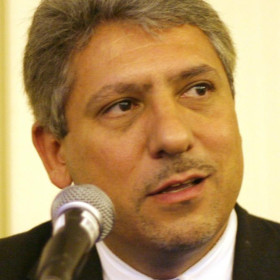Has everyone gone crazy with these self-destructing Eurozone policies?

A fair market way out of the impending Cyprus catastrophe The idea to haircut insured deposits is now recognized as an EU blunder. The Eurogroup Chairman reversed course, now recognizing Cyprus poses a systemic risk. The consequences of Cyprus exiting the Euro will be unpredictable. In fact, more wealth was lost in Europe and the global financial markets today than the trivial €6 Billion needed to rescue Cyprus from economic collapse. Multiples will be lost each day next week if a common sense solution is not found. According to Bloomberg, stocks head for their biggest weekly decline in four months. The Stoxx Europe 600 Index fell to its worst level since November. The Emerging markets index reached a three-month low. A gauge of European bank credit risk climbed. The cost of insuring against a default of European bank debt rose to a highest level since mid-November. German business confidence also declined. UK gas prices jumped to a seven-year high. Yet Cyprus has gas reserves worth multiples of the amount needed, not factored into the picture. All alternative proposals desperately put forth these days have proven short. Cyprus hoped for allies in Europe, Greece and Russia have remained on the sidelines. Economic common sense seems absent from consideration at all levels. Here’s a simple proposal. It is in the interest of all main parties and stakeholders to share the €6 Billion gap. No one needs to be cheated through haircuts, good and bank banks, and the like. Four main stakeholders get to lose if things collapse. The Cypriots, Europeans, Russians, and the big-pocket investors (mostly Russians). Why don’t each of these groups contribute a fourth (€1.5 Billion) each, in fair exchange for valuable investment instruments tied to Cyprus’s growth prospects, gas. A company can be set up with rights on sufficient specified amounts of natural gas reserves and floated on the London Stock Exchange. Once a fair market price is established in the marketplace, an appropriate number of shares can be given to investor groups. Strategic shareholders can guarantee that they will purchase any unsubscribed shares short of the €6 Billion that investors might not purchase voluntarily. This form of insurance guarantee can be divided among the four key stakeholders: The Cypriot investment fund just set up, the European lenders, the Russian government, and deposit holders above the insured €100,000 amount. In fact, if the parties agree to this plan and give it a month to be implemented, it may be that most, if not the whole amount, can be voluntarily purchased by large European and global institutional investors, such as hedge funds, pension funds etc, as an attractive investment growth opportunity at times of near-zero global interest rates. The above parties may not even need to chip in the full €1.5 Billion guaranteed amount expected of each if the money is raised in the private investor market. The EU loan should take the form of a variable interest GDP-linked loan, to help jump start the local economy with lower interest at first, with a conversion option into a specified amount of natural gas at a preset discounted price (after a 10-year conversion protection period). The conversion option will be given as fair exchange for the €1.5 B extra EU contribution. A scaled up alternative is to raise the entire 17 Billion needed for Cyprus’ rescue through such gas linked instruments, including floating the GDP-linked loan convertible into gas and/or shares in the company holding rights to a specified amount of gas reserves on the European and global financial markets. Again, the four stakeholder groups, the Cypriot investment fund, the EU, the Russians, and the big depositor investors, might be allocated a guaranteed portion each (e.g., 2 €Billion each, raising half the amount needed). Other strategic investors that might be helpful in cashing in Cyprus’ growth prospects and turning its gas into a source of energy security for the EU and the region (including Israel) might find it in their own interest to participate. The remaining amount would be voluntarily bought by local and international investors. One could start with the scaled up alternative, if feasible and acceptable to the EU and the parties, reverting to the limited scale one (€5.8 Billion) if it proves ambitious given the circumstances. The top leadership of the Troika, the Cyprus government and parliament, as well as the Russian government, should immediately discuss such an idea and agree to give it the space of time needed (e.g., a month) to be implemented. The scaled down plan of raising €1.5 Billion each from the EU lenders (in exchange for a conversion option of the GDP-linked loan into gas), the Cypriot investment fund just set up, the Russian government, and depositors above €100,000, will provide a worst-case guarantee to such an agreed economic plan to be implemented within a month. An alternative, that could be used in conjunction in case the scaled-up alternative is pursued, might be to engage a consortium of global financial institutions to pre-sell forward contracts involving specified amounts of Cyprus natural gas. Especially now that gas prices have reached a seven-year high today as a result of the economic madness going on around us, we can turn this madness and global insecurity to our advantage. The self-destructing madness that has inflicted all parties the last week must end. Lenos Trigeorgis holds a PhD (DBA) from Harvard University and is the Bank of Cyprus Chair Professor of Finance at the University of Cyprus and President of the Real Options Group. He has been a Visiting Professor of Finance at the London Business School. He is the author of Real Options (MIT Press, 1996), Strategic Investment (Princeton University Press, 2004) and Competitive Strategy (MIT Press, 2011).







 3287.99
3287.99 1275.09
1275.09
